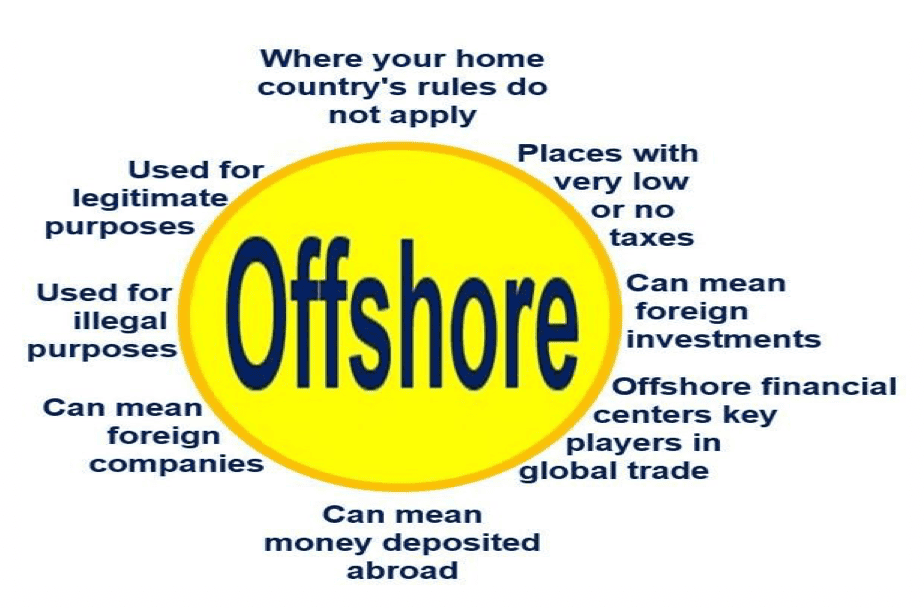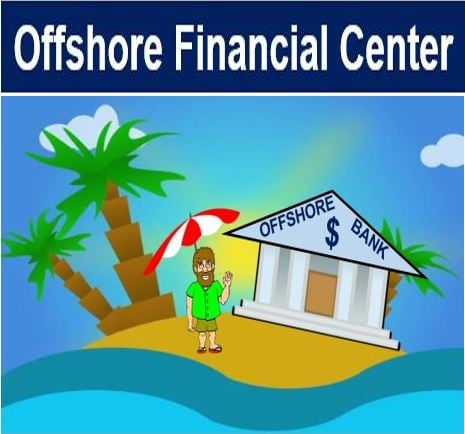Offshore refers to where the usual regulations of an entity’s home country do not apply. This may be a place at sea some distance from the shore, such as an island tax haven in the Caribbean, or just legally offshore. For example, if people resident outside the UK do business in London, they are participating in offshore transactions.
In other words, the term refers to anything that is outside the jurisdiction of a country – abroad.
In the world of business and finance, we use the term when talking about foreign companies, banks, deposits, and investments.
 Moving abroad could be a legitimate and legal strategy that somebody takes to avoid taxes. They may also want to enjoy less stringent rules and regulations.
Moving abroad could be a legitimate and legal strategy that somebody takes to avoid taxes. They may also want to enjoy less stringent rules and regulations.
Not all offshore activities, however, are legal. Money launderers and tax evaders commonly carry out their activities using financial institutions in tax havens.
According to the Oxford Living Dictionaries, offshore refers to businesses that people set up abroad. These people aim to take advantage of lower taxes or costs or less stringent regulation.
Offshore financial centers
Many countries, territories, and jurisdictions across the world have OFCs (offshore financial centers). Examples include:
Bahamas
Bahamas used to be a major OFC but has lost ground to other centers since its independence in 1973.
Bermuda
It is one of the world’s leaders in captive insurance, offshore funds, and aircraft registration.
British Virgin Islands
These tiny islands have a huge number of offshore companies. In fact, they probably have more than any other OFC.
Cayman Islands
Cayman has the strongest presence in the American securitization market. It also has the largest value of assets under management in offshore funds.

Dominica
Dominica has the world’s largest number of relatively new offshore companies. Since the turn of the century, it has become an important OFC for banks.
Dublin
Since the 1990s, Ireland’s capital city has attracted many multinational information technology, communications, and pharmaceutical companies. Companies such as Pfizer, Twitter, Accenture, Facebook, Yahoo!, PayPal, eBay, Amazon, Google and Microsoft have major operational bases in the city.
Financial services have also grown in Dublin. Corporate tax in Ireland is more than 70% lower than in the United States.
Hong Kong
The former British colony is one of the world’s major international financial centers. For over a century, Hong Kong has had an important capitalist service economy driven by free trade and low taxation.
It has one of the greatest concentrations of company headquarters in the Asia-Pacific region.
Jersey
Jersey has particularly strong funds management and banking sectors. It has a surprisingly high number of lawyers, fund managers, and professional advisers for such a small place.
Luxembourg
This tiny country is the market leader in UCITS (Undertakings for Collective Investments in Transferable Securities). UCITS is a regulatory framework of the European Commission that creates a harmonized regime across the European Union for the management and sale of mutual funds.
Luxembourg is also the largest offshore Eurobond issuer globally.
Mauritius
Mauritius is a popular inward and outward investment platform for European, African and Asian countries. It has several double-taxation agreements.
The OECD says Mauritius has substantially adopted and implemented internationally agreed **transparency and tax standards.
** Transparency refers to the extent to which all data is readily and openly available.
Panama:
Located where North and South America meet, Panama is a major international maritime center. However, since the 1990s, it has lost out to other competitors in the region.
New Zealand
New Zealand has the advantage of being a true primary jurisdiction with a stringent but practical regulatory regime. While still retaining close ties to Europe, it is an ideal place for the Asian markets.
A high proportion of OFCs are or used to be British colonies or Crown Dependencies. They frequently refer to themselves simply as offshore jurisdictions.
According to the US National Bureau of Economic Research, approximately 15% of all the countries in the world are tax havens today. Most of them are small and wealthy.
Offshore financial centers and the EU
Over the last few years, the European Union (EU) has made many OFCs sign up to the EU withholding tax and exchange of information directive. However, so far Bermuda and Barbados have not signed up.
An offshore company is one that operates in one country but is registered in another; usually a tax haven. An offshore fund is a fund that exists abroad.
Offshore manufacturing refers to relocating a production plant abroad, and importing the finished products. In other words, making the goods abroad and selling them at home.
An offshore trust is similar to an onshore one, but it is usually outside the jurisdiction of the trustor’s country.
Offshoring means relocating some of a firm’s operations abroad.
Compound word/phrases with ‘Offshore’
With the word ‘Offshore,’ we can make dozens of compound words and phrases. Here are twenty of them:
-
Offshore Banking
Financial activities conducted in a foreign country, often associated with favorable tax conditions or financial confidentiality.
-
Offshore Drilling
The extraction process of oil or gas from beneath the seafloor, usually executed from a structure situated in the ocean.
-
Offshore Investment
Investment operations carried out in a foreign country or region, often involving financial assets such as stocks, bonds, or real estate.
-
Offshore Company
A business entity registered or operating in a foreign country, typically for optimizing taxes, protecting assets, or engaging in international trade.
-
Offshore Wind
Wind energy generated from turbines located in bodies of water, such as seas or oceans, to harness the power of winds at sea.
-
Offshore Tax Haven
A country or jurisdiction known for its lenient tax regulations and financial confidentiality, often used for minimizing tax obligations or concealing wealth.
-
Offshore Platform
A structure located in the ocean for the purpose of drilling for oil or gas, often equipped with facilities for extracting and processing resources.
-
Offshore Outsourcing
The practice of delegating business processes or services to a third-party company located in a foreign country, typically to reduce expenses or access specialized expertise.
-
Offshore Development
The process of creating software or applications by a team located in a foreign country, often utilized to benefit from cost savings or specialized technological knowledge.
-
Offshore Asset
A financial or tangible asset held or located in a foreign jurisdiction, often used for the purpose of spreading risks or legal protection.
-
Offshore Rig
A large structure or vessel used for drilling and extracting oil or gas from beneath the ocean floor, equipped with specialized machinery and equipment.
-
Offshore Wealth Management
The professional management of assets and investments located in foreign jurisdictions, often involving financial planning, investment guidance, and risk control.
-
Offshore Jurisdiction
A country or territory known for its favorable legal and tax environment, often utilized for registering businesses or managing financial assets.
-
Offshore Investment Fund
A collective investment scheme organized in a foreign country, allowing investors to pool their resources for diversified investment opportunities.
-
Offshore Energy
Energy derived from natural resources located in bodies of water, such as oil, gas, or renewable sources like wind and tidal power.
-
Offshore Pipeline
A pipeline system installed on the seabed, used for transporting oil or gas from offshore drilling sites to onshore processing facilities or terminals.
-
Offshore Construction
The process of building or assembling structures, facilities, or installations in marine environments, often used for oil and gas exploration or renewable energy projects.
-
Offshore Project
A specific undertaking or initiative carried out in a foreign country or on the seabed, often involving significant investments and specialized expertise.
-
Offshore Deposit
Funds or assets held in a bank located in a foreign jurisdiction, often chosen for reasons such as financial privacy or access to higher interest rates.
-
Offshore Tax Planning
The strategic arrangement of financial affairs or investments in foreign jurisdictions to minimize tax liabilities and optimize financial returns.
‘Offshore’ in other languages
Here is a translation of the term ‘Offshore’ (in a banking/business context) in some other languages:
- Extraterritorial (Spanish)
- Offshore (German)
- Extraterritorial (French)
- Offshore (Portuguese)
- Offshore (Italian)
- В море (Russian)
- Havsområde (Swedish)
- Przedsiębiorstwo zagraniczne (Polish)
- オフショア会社” (Ofushoa kaisha) (Japanese)
- Deniz aşırı (Turkish)
- في البحر (Arabic)
- ऑफ़शोर (Hindi)
- 오프쇼어 (Korean)
- 近海 (Chinese)
- ท่าเรือในทะเล (Thai)
- Ngoại khơi (Vietnamese)
- Lepas pantai (Indonesian)
As you can see, in some countries, they use the English term.
Video -What is Offshore?
Watch this video from our sister channel in YouTube – Marketing Business Network – about the meaning of the term ‘Offshore’.
